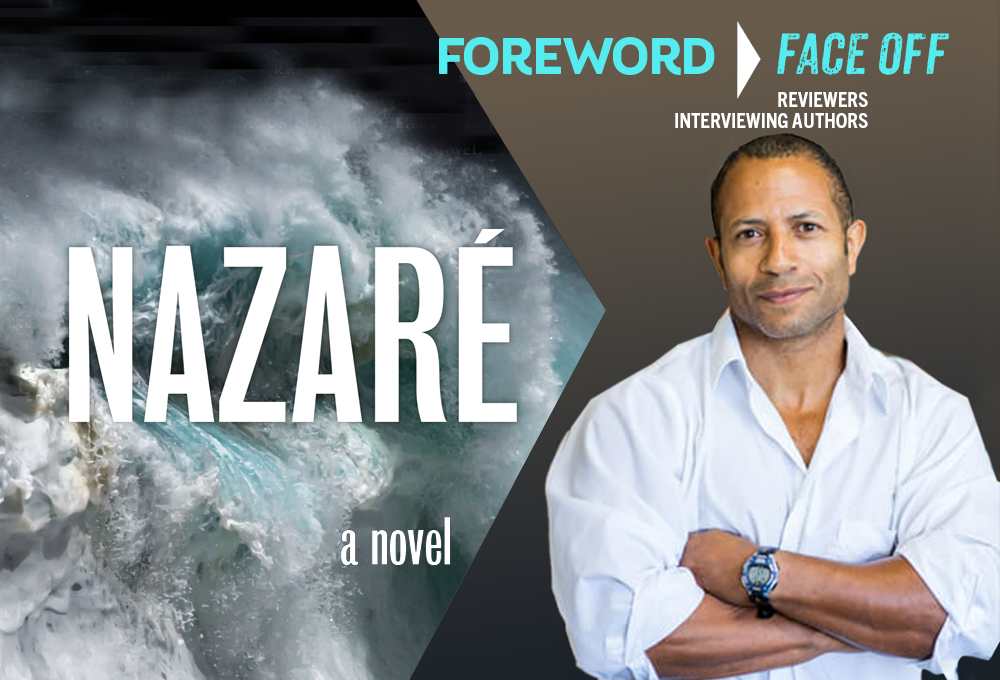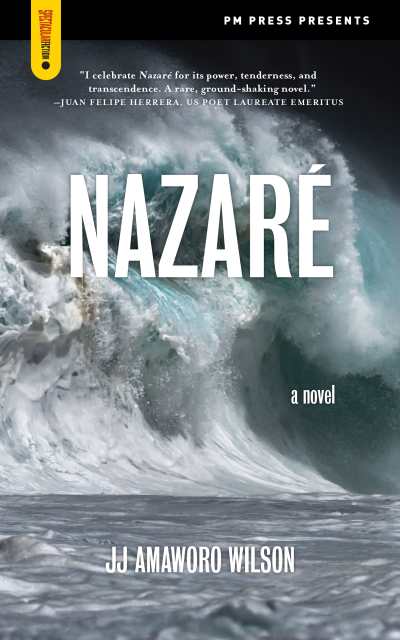Reviewer Michelle Anne Schingler Interviews JJ Amaworo Wilson, Author of Nazaré

You say you want a revolution?
Well, we have the blueprints for you in spellbinding literary fiction form. According to JJ Amaworo Wilson’s Nazaré, all that’s required to overthrow a government is a young boy who can muster up massive ocean waves, a few mystics and witches, and a good number of disgusted citizens willing to take to the streets. Easy enough!

Seeking more revolutionary insight, we assigned Foreword‘s Editor-in-Chief Michelle Schingler to connect with JJ. If Michelle’s starred review of Nazaré and this interview don’t whet your interest, well, we’re out of ideas.
And when you’ve finished reading the interview, head to our YouTube page for our latest Petit Foreword video interview, this one between Managing Editor Danielle Ballantyne and André Alexis, author of Ring.
The Matanza family seems so formidable that, for a long time, no one dares to challenge them. It’s notable, then, that you make a child their undoing. What was the importance of having someone so young, and so comparatively without in terms of material resources, be your hero?
Great question. Here’s something about children: they’re uncorrupted and pure of heart. Also, compared to adults, they know less and so they have fewer limits to their imagination. A child might really believe he can push a stranded whale back into the ocean alone or break into a dictator’s palace armed with nothing but a rusty nail.
As for the boy’s lack of material resources, the idea is that the poor don’t need a savior from the ruling classes; they’ll save themselves. They’ll do it by getting educated and making alliances, which is exactly what the kid does.
Nazaré is thick with magical realism (witches, reincarnation, people who command nature without meaning to) that gives its central David and Goliath struggle an inspirational quality. Are readers meant to see themselves in Kin—and, if so, against what forces cast in the Matanza role?
Whether readers see themselves in Kin is beyond my control. I can only try to create compelling characters. As for the Matanza family, it has elements of almost every dictatorship throughout history: hatred of its own people, which plays out in violence and repression. It’s not hard to find parallels in the modern world.
Balaal is a kind of everyland: it has deserts and hills and ports; its people are fishers, miners, performers, and merchants, and they speak a bevy of languages and represent a diverse gathering of cultures. The time period, too, wavers, marked by both contemporary and ancient features. Why situate your universal story in such an evocative between-place, and how did you develop the facets of this awesome land?
The answer is embedded in the question: I was aiming for universality. And I wanted the setting to be recognizably our world but also strange and dreamlike. The historian Raymond Craib, in his endorsement of the book, describes the story as “an epic of everywhere.” I hope the reader gets that same feeling.
I developed the setting by amalgamating features I’d seen in different countries: everything from the mountains of the Gila Wilderness in New Mexico, where I live, to the City of the Dead in Cairo, to a ramshackle fishing village in Brazil.
While he’s still quite a young man, Kin prepares himself to govern Balaal in a just way that no one among the living can imagine based on experience. After so many years of vicious rule that had such different implications for groups across the region, what do you imagine such rule would entail? What challenges would he face?
His rule would be marked by compassion for the poor and the vulnerable. It would have elements of Latin American liberation theology, and be based on the principle of equal justice for all.
The challenges, as always, would come from the entrenched powers: oligarchs and their cronies who live off the scraps. Thieves aren’t known for handing back the loot voluntarily, whether it be Benin bronzes or stolen land, and Kin would face the same recalcitrance.
Despite the literal magic that runs throughout it, to me, the most breathtaking occurrence of the book is when Iquique—despite seeming to have no tangible reason to believe so—tells Kin that “all tyrannies fall.” Indeed, Balaal’s past seems to suggest the opposite. Where do you suppose such conviction rises from?
She simply knows her history. There is no human system—not the Roman Empire, not the divine right of kings, not US slavery—that lasts forever. As the Apache leader Geronimo said, “Nothing survives but the rock.”
What can we look for from you next?
More fiction, maybe based on one of the many humanitarian crises unfolding. I’m trying to follow the novelist’s dictum: “make something beautiful out of something ugly,” transforming tragedy into art. It’s another way to memorialize the great struggles for justice. And, of course, a novelist is an entertainer; the stories and language should bring joy, and I hope mine do.
Michelle Anne Schingler
